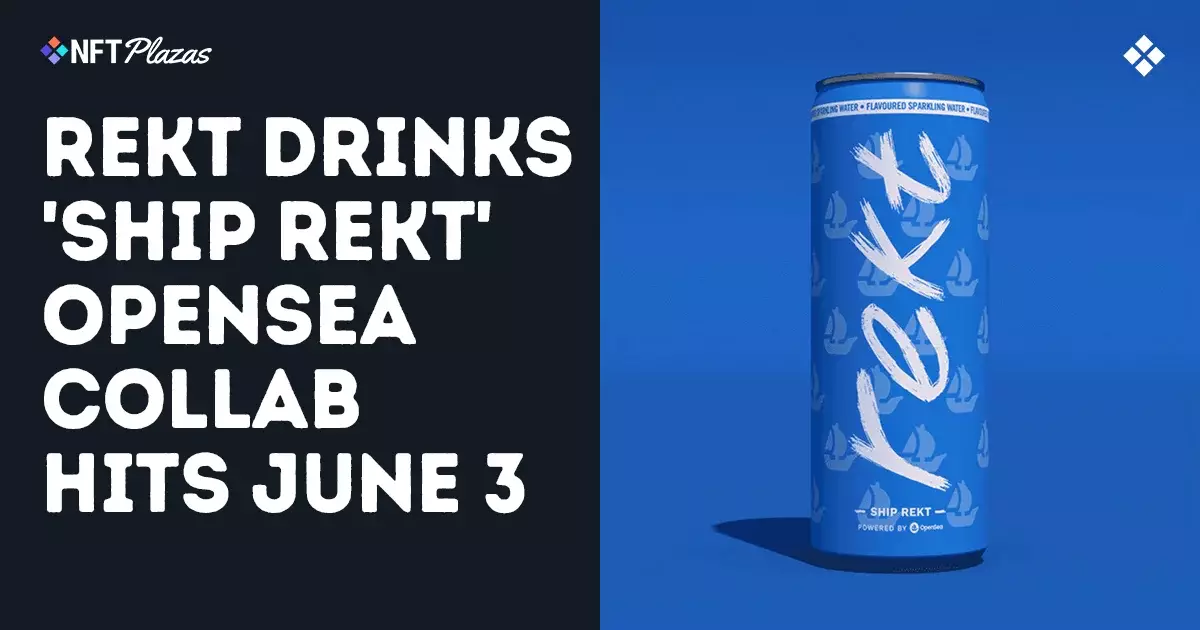The rise of NFTs has been nothing short of revolutionary, especially as brands find innovative ways to marry digital assets with physical products. Rekt Drinks, a Web3-powered sparkling water brand, stands at the forefront of this trend with its latest collaboration with OpenSea for the launch of its limited-edition flavor, Ship Rekt. Set to drop on June 3, this grapefruit and raspberry-flavored drink encapsulates not just a beverage but a new approach to consumer engagement, manipulating the marketing landscape quite forcefully. For the center-right, pro-business proponents, such moves are an exciting development. However, concerns remain about the sustainability and integrity of such marketing strategies.
The Unorthodox Flavor Teaming Up with Tech Giants
The collaboration between Rekt Drinks and OpenSea shows an audacious attempt to penetrate the beverage market in a way that harnesses both lifestyle and the burgeoning NFT economy. With a release of 7,500 NFTs priced at 0.029 ETH each, this isn’t just any drink offering; it is a manifestation of digital heritage tied with a product you can consume. While critics will argue about the environmental impact of NFTs and the crude commodification of consumer goods, proponents must acknowledge that Rekt is reshaping brand identity and loyalty in a perilously competitive arena. The beverage industry’s traditional methods seem almost archaic compared to Rekt’s NFT-centric approach.
Tokenization of Drinks: A Double-Edged Sword
Each NFT for the Ship Rekt flavor serves a dual purpose—an ownership right to 24 cans of the beverage and a key to unlock loyalty rewards, including OpenSea XP and Rekt DRANK points. This hyper-structured loyalty model following a successful formula of earning points has attracted attention but raises several ethical questions. Should consumers become collateral players in a speculative market where they purchase digital tokens expecting future rewards? While it may encourage customer engagement, there’s an inherent risk of alienation for those unfamiliar with the crypto world. Those on the center-right may argue that this approach further stratifies the consumer landscape, favoring technologically savvy consumers while leaving others behind.
The Gimmick that Works: Selling Out in Minutes
Rekt’s previous launches provide compelling evidence that their innovative strategies resonate with consumers. The Liquidated Lime flavor sold out in less than two days, an impressive feat that indicates a growing market for such hybrid offerings. Following that, the Abstract Apple variety flew off the shelves in an astounding 40 minutes. For many in the business community, this indicates that we might be witnessing a new wave of marketing that truly captivates consumers. However, the fleeting nature of these drops also raises concerns that Rekt could be fostering a “buy now or never” mentality that prioritizes scarcity over substantial product merit.
The Competitive Edge: Triumphs and Trials
Rekt’s upcoming launch highlights an interesting competitive strategy: U.S. and Canadian buyers have a separate drop from international buyers, with the first to sell out receiving a bonus. This gamification of loyalty isn’t unprecedented, but it certainly plays on the historical nature of robust competition, appealing to the instincts of pro-business advocates. However, such tactics might come off as divisive rather than inclusive. There is a fine line between stimulating demand and creating an arbitrary divide among potential customers who are equally interested in the product.
Shipping Costs and Global Accessibility
An intriguing aspect of the NFT drop lies in Rekt’s approach to shipping. While consumers in the U.S., EU, and UK enjoying free shipping for bulk orders could view this as accessible, individuals in less populated regions may not share that sentiment. The disparity in shipping policies gives off a vibe that the company measures its engagement on a geographic scale, potentially limiting exposure to broader markets. For center-right advocates, the emphasis on free trade and equality over these artificial barriers should be revisited, lest innovative businesses would inadvertently build a foundation on uneven access.
Concluding Thoughts
In a marketplace saturated with the mundane, Rekt Drinks is set to either redefine consumer transactions or face backlash for hyper-commercializing an everyday product. While the NFT and beverage crossover has captivated many, it remains to be seen if this is a fleeting trend or a long-lasting transformation. Rekt Drinks stands at a crossroads, prompting consumers and businesses alike to ponder deeply about the future of commerce, loyalty, and what it truly means to engage with a brand in the digital age.















